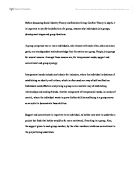Karl Marxs theory of social change, known as a conflict perspective, is a sociological approach that assumes that social behavior is best understood in terms of conflict or tension between groups. His theory
Social Change
Social change is the difference between past and present condition of any social organization or structure. The theory of social change is and always will be a common theme of sociologists. Perhaps, historically, the most well known sociologists who had competing theories for social change were Karl Marx and Max Weber. Both sociologists agree on the concept that change is, in absolute terms, natural, continuous and static in all cases but their agreement ended there. Marx’s theory is known as the conflict perspective and Weber’s theory is known as the interpretivist perspective.
Karl Marxís theory of social change, known as a conflict perspective, is a sociological approach that assumes that social behavior is best understood in terms of conflict or tension between groups. His theory may also be referred to as historical materialism. This idea of historical materialism is that "men enter into the production and appropriation of wealth [as] the major structural source of change." Marx maintained that people, historically, were consistently entering into the work force for strictly material reasons. By definition, in Marxism, economics was their driving force; therefore, the self-interest of the worker was of sole concern. Marxís theory focuses on the different stages a society must pass through to become a utopia. His theory applies to the changing of the English society from Feudalism (in which tenancy of land determines ones social position), through the industrial evolution (in which there were inventions and new forms of technology) to capitalism (in which the means of production are largely in private hands and the main incentive for economic activity is the accumulation of profits. As Marx himself wrote in A Contribution to the Critique of Political Economy, "The mode of production of material life determines the general character of the social, political and spiritual processes of life. It is not the consciousness of men that determines their being, but, on the contrary, their social being that determines their consciousness". This is the foundation of Marxís theory, and so in creating it, he followed the mode of production throughout the stages in socialization.







